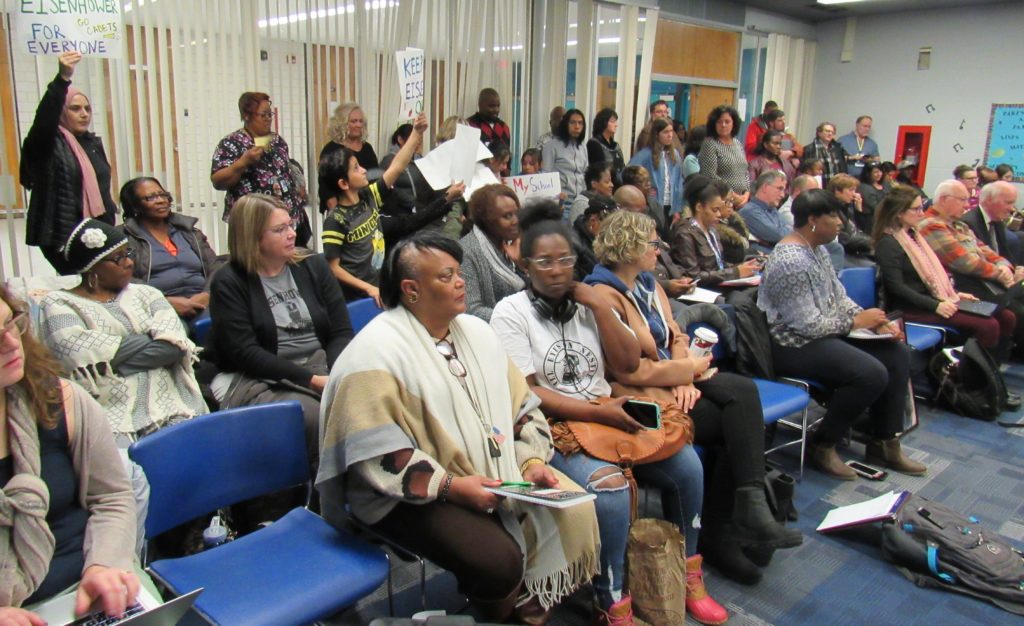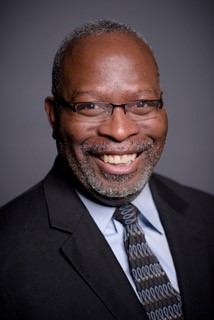By Harold C. Ford
“We have to get to a number that will allow us to be a viable district…We have too much infrastructure for the number of students we’re trying to educate.” …Derrick Lopez, superintendent, Flint Community Schools
The elected and appointed leaders of Flint Community Schools (FCS) have decided to keep looking for possible solutions to eliminate the district’s massive debt and, for the time being, postpone final decisions on the closing and consolidation of school buildings.

Eisenhower Elementary students advocated for their school before the Flint Community Schools board Nov. 19. (Photo by Harold Ford)
The postponement decision was announced before an anticipatory, boisterous, standing-room only crowd of about 60 on Nov. 19 at Flint’s Southwestern Classical Academy.
However, near the end of the nearly three-hour special board meeting, FCS Superintendent Derrick Lopez revealed the key component of the district’s tentative deficit elimination plan–school closings and consolidations. They include:
- Students at Holmes STEM Academy (grades 3-6) would merge with Brownell K-2 STEM Academy students (grades K-2) at the Brownell campus.
- Students at Flint Junior High School (grades 7-8, located at the former Northwestern High School) would move to the Holmes building.
- The former Northwestern High School, the largest Flint campus still open at 212,000 square feet, would be closed.
- The Accelerated Learning Academy (grades 7-12, located at the former Scott School) would move to a wing at Southwestern Classical Academy (grades 9-12).
- Scott School would be closed.
- Pierce Elementary School students (grades K-6) would move to Doyle/Ryder Elementary School (grades K-6), Freeman Elementary School (grades K-6), and Potter Elementary School (grades K-6).
- The Pierce building would be closed.
- Eisenhower Elementary School students (grades K-6) would move to Durant-Tuuri-Mott Elementary School (grades K-6) or Neithercut Elementary (grades K-6).
- The Eisenhower building would be closed.

Standing room only crowd for the school board discussion of proposed school closures (Photo by Harold Ford)
Postponement in order to take a closer look:
Most of the 15 speakers who addressed the board urged the district’s decision-makers to spend more time and do more research before closing buildings.
“It’s been less than ten days since the public proposal was handed to the newspaper,” said Maggie Wright, an Eisenhower Elementary teacher, “and you are being asked to make a decision tonight with no community input, no questions, with no research to say what buildings are the best buildings.”
“Why is it we’re being told in the fall that schools are going to be closed in January?” Dana D. Dyson asked. “It makes no sense. It’s illogical.”
“We’re not asking the board to make any decisions tonight,” Lopez eventually responded. “I am also recommending to the board that we do not do any closings in January and February.” His announcement was met with applause from members of the community.
In the meantime, Flint’s board members and administrators will continue to gather input from the public and scrutinize FCS infrastructure. “This (the deficit elimination plan including school closures) is contingent upon walking the buildings and using the space the way they say they’re being used,” said Lopez.
Comments target administration and legal counsel:
Comments from audience members and board members alike targeted the district’s administration and legal counsel.
“I believe this district is still too top-heavy,” asserted Blake Strozier, the board’s vice president. “We still have too many central office employees and not enough people in the classrooms that are handling day-to-day operations.”
“We’re top-heavy in administration,” Board Trustee Carol McIntosh agreed. “The first thing we need to look at is…cutting at the top.”
“Top-heavy…yes we are, not just administration, but legal fees,” added Board Trustee Danielle Green. “We pay too much in legal fees.”
“Kendall’s a Cadillac,” Board Trustee Casey Lester said, in reference to the board’s legal counsel Kendall Williams. We’re a Chevette budget.”
Other comments took aim at the district’s multi-floor administration building at 923 E. Kearsley St. “There are no sacred cows,” Board President Diana Wright warned. “One of the buildings we need to sell is the administration building.”
“I wouldn’t vote to close any school before we closed the administration building,” Lester added. “We’re in the industry of educating children and not in the industry of administration.”
Lopez cautioned the board members that it would cost “millions of dollars to move” the technology infrastructure that is located in the administration building.
A foreboding financial challenge, a familiar cycle:
Flint’s public school system is confronted with an existential financial crisis decades in the making. A school system that boasted nearly 48,000 students in 1968 has seen its student count drop to about 3,700. Each lost student currently takes with him/her about $8,100 in state aid.
“I don’t want the total demise of Flint schools because we owe so much money and the state will say, ‘We have to close you,’” said Betty Ramsdell, a board trustee with a long personal history in the district.
“One thing that is very clear to me is that we have a fiscal challenge we have to meet,” said Lopez. “We’ve run about a $5.7 million deficit every year…for about five years.”
The deficit includes an annual repayment of $2.1 million on a nearly $20 million loan taken out by the district in 2014. Lopez noted that just the interest on the loan costs FCS $920,000 each year. He indicated that the district is asking lenders for relief on the loan interest.
An all-too-familiar cycle has bedeviled the district for decades: students leave the district; revenues decline; schools close; more students leave the district, in part, because their schools are closed; revenues decline further; more schools close…
“How did we get here?”
“I don’t understand how, strategically, we got here,” said Dyson. “How did we get here?” Numerous theories were advanced at the special board meeting as reasons for the FCS conundrum.
Abandonment by GM and depopulation: “We did not ask General Motors to pull their behinds out,” railed Ramsdell, “and leave people jobless.”
Special needs students: “We have double the number of special needs students…double the state average,” said Lopez. “We don’t get what we should be getting in terms of our special needs students in my opinion.” According to Lopez, the cost of education for a special needs student is double that of a general education student.
Flint shortchanged by GISD: “The GISD has not been sending (special needs) money over here to the city of Flint,” claimed Flint resident Arthur Woodson. John Miller, an attorney representing the Genesee Intermediate School District, disputes Woodson’s take. “Most of those students (exposed to lead),” he told the Detroit News, “are now at other districts.
Charter schools’ givebacks: “The charter schools take our students,” said Lopez, “and when the student count days are over with, they release those students…back to Flint schools.” FCS loses state aid as a result. Lopez claimed 185 such “givebacks” in the past calendar year.
Charter schools’ takeaways: “Some of the folks in this room let the charters come in and take these kids,” said resident Gina Luster. Laura McIntyre, a Flint resident and activist, cited the new Flint Cultural Center Academy as a prime example of a charter school siphoning children and state aid from FCS.
Too many vacant buildings: “In terms of selling buildings, that’s where we need to start,” said Wright, “to take the dead weight off our (tax) rolls.”
Flint water crisis: Flint schools are scrambling to install “smart water stations” by the Dec. 23-Jan. 3 holiday break with a $480,000 donation from the Musk Foundation. That Flint has lost residents and students due to the water crisis is virtually inarguable.
Rock and a hard place:
Flint’s educational leaders are caught between the proverbial rock and a hard place, and they know it. They are confronted by two bad choices: either make drastic cuts in the district’s infrastructure and bloated budget or risk the district’s very survival.
“There are tough decisions that have to be made,” concluded Lester. “These are conversations that were kicked down the road and we become the face of the bad guys. It sucks…Not everybody is going to come out of this happy.

Schools’ supporters dig in:
“I don’t support closing any schools,” said Wright. “We should do everything in our power to find another way.”
“When we close a school in Flint, we kill the entire neighborhood,” observed Strozier. “For the children of the city of Flint, I can’t support any more closures.”
“I know I wouldn’t vote to close any schools today, or this year,” said Lester.
“Don’t close none of these schools,” said impassioned Flint resident Alonzo Price. “Find the money. Fight like hell.”
“I’m asking you do not close our heart,” pleaded Flint resident Carolyn Shannon. “Please do not close Scott School.”
“These are families that need Eisenhower,” said Maha Makhrais, spokesperson for a large contingent of Eisenhower Elementary students, parents, and staff.
“We finally got Flint (Junior High) and Brownell halfway stable on that north end,” FCS employee Joyce Ellis McNeil reported, “now you’re going to shake their world up and pack them in like a bunch of sardines.”
McIntosh argued against the closing of the Northwestern and Scott buildings: “We have a new commercial kitchen at Northwestern…We put a new roof not that long ago over our gym. We have a new track. It has a new football field…We spent over a million dollars on (upgrading) Scott…I would never, ever support closing Northwestern or Scott. ”
Others advise fiscal responsibility:
“Sometimes schools have to be closed because people have left that area,” said Ramsdell. “There are things we’re victims of…We built all these schools and then we lost all our population.”
“We’re not all going to be happy because we have to do something,” concluded Vera Perry, board trustee. “We don’t want the district to fold.”
Staff attrition continues:
At its regular board meeting on Nov. 20, the departure of five more educators with 33 years of total service to the district was reported. That brings to 72 the number of educators that have left the district (including one death) in 2019 taking with them over 933 years of experience in Flint schools.
Cassandra Wilson, FCS executive director of human resources, when asked the reason(s) educators continue to leave the district, said: “A lot of them indicate they receive other offers from other places. Sometimes there’s more compensation. Other times they feel lack of support.”
Superintendent stability:
Also at its Nov. 20 meeting, board trustee Lester reported on information provided at a fall conference of the Michigan Association of School Boards in Traverse City, particularly an “Investing in Your Superintendent” class.
“The average shelf life (tenure) of a superintendent in the state of Michigan is 2.7 years,” said Lester. “It’s less if that superintendent is a person of color, a woman, or in an impoverished district.”
“They said one of the biggest things you can do as a board to eliminate some of that turnover is to reinvest in the education development of the superintendent,” continued Lester. “If we’re not reinvesting in our superintendent we’re doing ourselves a disservice.”
“So there’s two scary things that people (like board of education members) do,” said Lester. “What happens if we invest in the superintendent and he leaves? But the scarier thing is, what happens if you don’t reinvest in him and he stays?”
“I think we need to look at what we can do to reinvest back into the superintendent,” he advised. He urged looking at the budget to find money for such an endeavor. “I think we owe it to ourselves.”
Lopez sought superintendent position at Farmington

Derrick Lopez (FCS photo)
Derrick Lopez, Flint’s superintendent since August 2018, was one of seven candidates who interviewed for the superintendent’s job at Farmington Public Schools, as reported by the publication Hometown Life on May 9, 2019
Including his appointment as Flint superintendent in 2018, Lopez held seven positions in 15 years from 2003 to 2018. They included:
- 2003-2004: principal, Highland Park High School
- 2004-2007: principal, Berkley High School
- 2007-2009: chief of high school reform, Pittsburgh Public Schools
- 2009-2011: assistant superintendent for secondary schools, Pittsburgh Public Schools
- 2011-2014: president and CEO of Homewood Children’s Village, Pittsburgh
- 2015-2018: interim superintendent and associate superintendent, Southfield Public Schools
- 2018-2019: superintendent, Flint Community Schools
EVM Staff Writer and Education Beat reporter Harold C. Ford can be reached at hcford1185@gmail.com.



You must be logged in to post a comment.